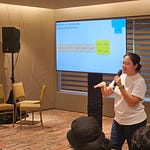Hey everyone,
Today I want to share my mental model of how we can provide a range of very unique services to customers. With adequate client feedback, iterative productization of services, and a network of clients, we can leverage the high-value opportunities of the current market environment as individuals, and as a collective.
In our podcast Colin and I elaborate on some of the points from the newsletter. I also added time stamps below in case you want to jump to a specific section:
00:00.0 Why we should have a simple mission statement
03:25.5 Why many people seem to be stuck
08:07.1 How we started defining meaningful work for ourselves
15:13.2 Going from a unique skill to paid work
17:00.9 How Deep Work evolved so far and why
25:19.8 What was missing from the design studio?
32:54.7 What it means to have multiple business units
41:04.3 Review of our business development process
44:20.7 How we can keep building out Deep Work from here
Also, you can now listen to our podcast on Spotify.
Simplifying Deep Work’s public-facing mission
As we keep working together more, people in our network keep asking us
“What does Deep Work do?“
And so far, the answer we have seems a bit technical:
Our mission is to provide organizations with a web3-native framework that reduces operational costs, supports intelligent payment distribution, and fosters an intrinsically motivated, health-first working culture.
More recently, I realized that it’s actually not necessary for everyone to understand the fine technical details or “how“ right away. Here is something I played around with that sounds more simple, yet concrete:
Making meaningful work accessible to everyone.
To move towards this mission, we design user-facing products, consult on organizational design, host IRL events to facilitate the development of authentic relationships, write about novel approaches for work and coordination, and build software to apply these principles in the context of a sustainable organization.
So to everyone interested in the details, the longer mission statement would still be relevant.
From unique skills to paid work
Most conversations I had over the last weeks were with people struggling to actualize themselves while staying true to their values and being able to pay bills.
Most jobs might produce enough income or other benefits, but we face the danger of slipping into comfort, wasting time in meaningless meetings, and working on outcomes we disagree with.
For a while, our design studio was pretty close to the ideal, but we missed the crucial part of business development since most projects came through referrals.
Please consider that the following plan to address this challenge will likely take time and might change direction.
Business development for a decentralized organization
Over the last half year, I researched business development approaches to create a sales strategy for our unique set of skills. My goal was to stay flexible as a community, and develop high-value-density offerings that build trust, solve concrete problems, and leave clients happy.
Some of us worked on mapping out the lifecycle of a project team, gathering their pain points, and coming up with bespoke services, relative to the stage and problem.
And one of my fundamental assumptions for any work that deserves to be paid is that we are not just providing services or offering our (chronological) time, but specific and bespoke productized services.
We have established the concept of repeatable workflows (how to create the outcome of the productized service) but the way we describe the service to customers should be identical to how we would describe a physical product.
In a past newsletter, I also mentioned that most teams in our ecosystem tend to hesitate to spend large sums of money on products and services. At least based on my observation and conversations with founders and investors.
I arranged some of the products we offer in order of commitment/cost and am currently following this approach to slowly establish trust and rapport, while always giving our clients the freedom to go only as far as they feel adequate.

Splitting up the process into these steps also increases the frequency of feedback we receive and helps us refine the description of each product.
For each paid productized service we offered in the past, we now created product pages in Notion (For example the Business Management Foundation Session, thanks to everyone's contribution in writing these).
So each time we complete one, I can gather feedback and refine the way we articulate the value of the product to new clients.
The price is determined by assuming the cost of the alternative, i.e. how much time/money the product service saves clients if they don’t buy it.
If there is no clear reference point, we start with a low/negotiable price, then increase it with every repetition until we reach a threshold where clients drop off.
Attracting the right customers
My task as the lead of each team is now to make sure these product descriptions stay as accurate as possible and seek out opportunities to make our productized services discoverable.
As long as the descriptions are fine-tuned, I’m leveraging our existing network of founders and investors by actively asking for feedback and referrals, as well as showing up at IRL conferences.
Once we reach a high degree of confidence in the value of our offering (when the feedback starts repeating itself) we can create sharable websites for each product.
I’m personally focusing on the org-design/business management sessions so I can progress quicker and immediately share my learnings, which you can then replicate on your own offerings (within or outside of Deep Work).
Combining products into autonomous business units
As an organization, Deep Work has created many unique products, categorized into different teams.
I assume that if we keep following the strategy outlined above and create customer-facing descriptions of each product we offer, each team could progressively become an autonomous business unit in the long term.
I.e. generating its own revenue while together solving a complex problem. This is important if we want to stay profitable while retaining individual autonomy and meaning.
A few smaller notes
Team cohesion and alignment seem to be a huge opportunity in the space, based on feedback from the recent sessions. I think we should be more confident articulating that we focus on alignment and cohesion of teams, irrespective of the deliverable.
I’ve been interviewed about my perspective on network states, at the Network State side-event at EthCC.
We’re partnering with EVM Capital, currently co-producing articles under “the future of work“ theme and sharing current developments related to technological innovation in the labor economy.
Someone created a scam website for Deep Teams. I know who but not sure if their account got compromised, I banned them from Discord either way.
Please leave the website immediately if you see this:
Since 2019 (beginning of Deep Work) the CPI (consumer price index) in the US has increased by about 23%. Since we have never adjusted our prices for inflation, so we will have to re-calculate our rates as we book new projects.
Events we're planning to attend
Web3 summit in Berlin (Aug 19-21)
EthTokyo in Tokyo (Aug 23-26)
Token2049 (and Solana Breakpoint) in Singapore (Sept 18-21)
Devcon 7 in Bangkok (Nov 12-15)
EthDenver in Denver (Feb 23 - Mar 2, 2025)
Recommended reading
Built to Sell by John Warillow
This is the first book I read years ago that explained the psychological advantages of productizing services.
Show them the money? The role of pay, managerial need support, and justice in a self-determination theory model of intrinsic work motivation by Olafsen, A. H., Halvari, H., Forest, J. & Deci, E. L.
The paper shows how “managerial need support“ (acknowledging employees’ perspectives, providing meaningful information, offering opportunities for choice, encouraging self-initiation, etc.) facilitates intrinsic motivation. The use of extrinsic motivators like money induces “controlled motivation“, which is helpful for boring/repetitive tasks, but at the cost of autonomy. Money seems to motivate people in unpleasant working environments with mundane tasks, whereas “need support” drives self-determination and autonomy.
Troubled by Rob Henderson
The author is posting a lot of contemporary social science research on his social media, and the book is his autobiography. While I’m personally more interested in his current research, his book creates a stark contrast between a lower-class upbringing in the US and the social norms (he often refers to as “luxury beliefs“) he experienced in Ivy League universities.
Let me know if you have any comments or questions and see you in two weeks!
Andrej


















